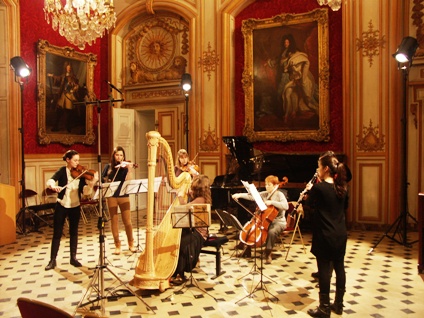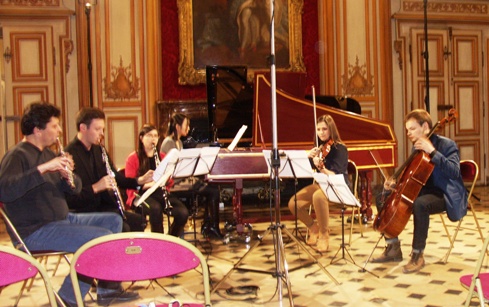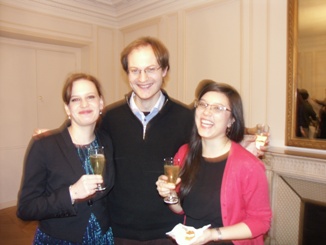Voices from the Sylff Community
The seventh Sylff chamber music program, “New York-Paris-Vienna,” was held recently in Paris with a grant from the Tokyo Foundation. Here, Paris steering committee member Gretchen Amussen introduces some of the enthusiastic comments by the participating fellows and professors.
* * *
From January 16 to 24, 2014, the Paris Conservatoire hosted eight Sylff musicians from Vienna’s University of Music and Performing Arts and New York’s Juilliard School, who joined forces with four professors and six Paris Sylff fellows for a week of chamber music, culminating in a magnificent concert in the Invalides Army Museum’s historic seventeenth-century Grand Salon. The musicians, representing eight nationalities, performed works by Tomasi, Ravel, Jolivet, De Falla, Villa-Lobos, and Mozart.
“Playing music with new people is always a challenge,” said French fellow and flutist Mathilde Calderini of the experience, “because first you have to ‘find’ each other. But in the end it’s worth it!”
For French fellows Lomic Lamouroux and Carl-Emmanuel Fisbach, who participated in last year’s Viennese encounter, as well as pianist Antoine Alerini, who had gone to New York several years ago, being the hosts meant taking responsibility for sharing French culture. For Lomic, “The human aspect is essential, which is why I wanted to spend time with other fellows so they could better understand our country, our art, and who we are, much as had been the case for me when I went to Vienna.” In fact, for all involved, the cultural dimension proved as important as the music making.
For Juilliard’s Francesca dePasquale, “It’s one thing to speak about the French sound for French composers and completely another to be in France, see the incredible architecture, art, museums, and learn about the kind of sound here. For me, this was very valuable as an artist.” Vienna’s Georgina Oakes agreed, saying “I can’t get over the beauty of the city, which I’m sure will continue to inspire my artistry.”
The cultural aspect of the week got off to a vibrant start with an afternoon tour of the city, followed by dinner at the Auberge des Pyrénées-Cévennes. Traditional French cooking from the Southwest and from Lyon was featured, allowing for new culinary discoveries. Georgina Oakes, doubtless the most adventurous, chose a dish featuring pig’s feet, which she joyfully shared with those sitting close to her. For Georgina, “tasting” a culture seemed as important as hearing a new language and visiting historic monuments.
The project began weeks earlier with the sending of hard-to-find scores and parts to the visiting fellows. Upon their arrival, complex rehearsal schedules were distributed, and students were taken on a tour of the Invalides Army Museum. Of particular interest to the visitors was Paris’s system of reserving time and space for personal practice at the Conservatoire: something that the French students take for granted but that others felt could be incorporated in their home schools. Rehearsals began shortly thereafter, with the sounds of music, animated discussion in multiple languages, laughter, and music-making reverberating late into the night. 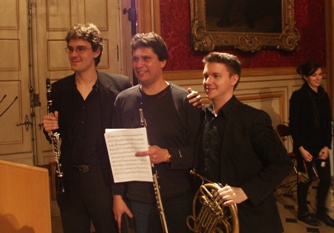
One feature of the Paris Sylff project is that students and teachers perform together. For oboist and chamber music professor David Walter, when you “play a program with students, their minds are fresh and full of hope regarding the music. They are ready to jump in if you invite them to do so. You must participate in much the same way they do, and expect from yourself what you expect from them—which is quite demanding and not always comfortable.”
Guitar professor Jean-Marc Zwellenreuther mused that the Brazilian composer Hector Villa-Lobos, “himself a great traveller and lover of Paris, would have been happy to see and hear these young musicians who were so enthusiastic, generous, and kind.” Cellist and professor Diana Ligeti commented, “Speaking and understanding the differences in musical pedagogy in our respective countries made us stronger and more able to give a personal, authentic interpretation.” Flute professor Vincent Lucas noted there were “many exchanges in which each musician listened to one another and engaged with real complicity and intelligence—just as one does with professional musicians.” And French harpist and fellow Maureen Thiébaut said, “For several days, we worked, played, discussed, and almost lived together—doubtless the best way to build both the human and musical cohesion of the ensemble.”
What did the different styles and cultures bring to the music? For Lomic, “The difference in styles was not a break in creativity but just the opposite: What can be better than trying to find a common way of playing, thinking, and sounding, despite individual, cultural, or stylistic differences? The concert was a perfect illustration of these riches: Many different sounds, styles, and nationalities . . . and in the end, a united sound and performance.” Juilliard’s oboist Max Blair found the experience a more interactive one in terms of teaching and rehearsing. “It made me think about the process of collaboration in a new way: striving to find a cohesive interpretation of a piece in which each one knows when to lead and when to follow.”
The presence of unusual instruments—especially the Viennese oboe and French bassoon—was treasured by Juilliard’s Anton Rist: “I have learned about different playing and detaching styles as well as different instruments, and these have helped me to develop my ear for timbre and blend.” Above and beyond this, as Carl-Emmanuel suggested, coming together constituted an opportunity to develop a “healthy distance from one’s own culture, to listen, communicate, and interact fully.”
What did each learn from the other? For Juilliard’s Trevor Nuckols, “from my colleagues in Paris and Vienna, an incredible regard for exchanging ideas both musically and nonmusically, gaining thus a much more open-minded and wordly perspective.” For Lithuanian musicians Gleb Pysniak and Dalia Dedinskaite studying in Vienna, “from the Americans, friendship, care, precision in music; from the French: freedom, optimism, inspiration in music.” Or as French violist Marina Capstick put it, “the language of music is universal, and I could see this clearly during the seminar.” 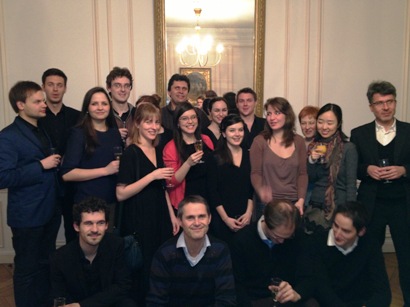 Anton Rist felt he developed his skills as a chamber musician, whereas Mathilde Calderini felt the experience provided an excellent opportunity to build her international professional network. As Georgina Oakes noted, “Music connects us all!”
Anton Rist felt he developed his skills as a chamber musician, whereas Mathilde Calderini felt the experience provided an excellent opportunity to build her international professional network. As Georgina Oakes noted, “Music connects us all!”
The seminar experience led to enthusiastic suggestions for the future, such as adding a second concert or even a mini-tour. Vienna’s Julia Zulus suggested finding a work that would allow all members of the group to perform together. . . . All thoughts to take into consideration for future sessions!
As Vincent Lucas said, the “souvenir of this music-making is a lovely one,” and speaking for all the fellows, American Trevor Nuckols waxed eloquent: “Thank you for everything! I’d love to participate in another such international exchange opportunity. It has been a magical and life-changing experience!”

Gretchen Amussen
Born and raised in New York City, the Franco-American Gretchen Amussen studied music and French at university and then organ with Xavier Darasse at the Toulouse Conservatoire. Since 1992 she has worked at the Paris Conservatoire, where as Director for External Affairs and International Relations she has helped promote the Conservatoire, its students and teachers through an extensive worldwide network of educational and cultural organizations.
